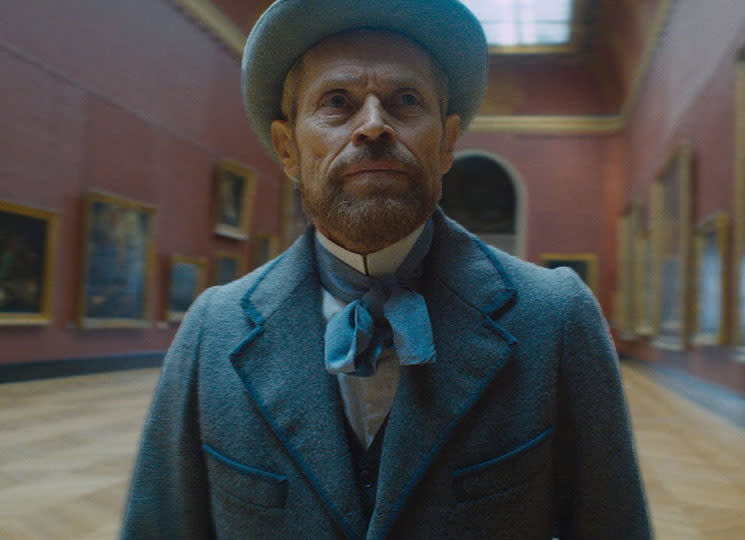At some point, every struggling artist has imagined themselves a bit like Vincent Van Gogh: a misunderstood genius, unappreciated in their own time, but leaving behind a rich body of brilliant work to be revered by future generations.
It's a romantic thought that director Julian Schnabel seems completely enamoured with in At Eternity's Gate. This biopic focuses squarely on Van Gogh's brilliance, marvelling at the work he created while living in penury in the south of France, including his stint in a mental asylum after severing his own ear. Children mock him, a priest (Mads Mikkelsen) gently tries to explain that a painting is "ugly," and every scene practically screams: how did these people overlook the genius in their midst?
The film follows the artist's later years, when Van Gogh — played here by Willem Dafoe, who is 26 years older than the artist at the time of his death — moved to the quaint town of Arles. We see many shots of him exploring the local landscape and painting amidst the trees, and extended scenes are devoted to watching his brushstrokes, while composer Tatiana Lisovskaya's stately piano is both grand and turbulent.
Unable to make a living from his art, Van Gogh is financially supported by his loving brother Theo (Rupert Friend). Vincent's only other close relationship is with fellow post-impressionist Paul Gauguin (Oscar Isaac), who is presented as the protagonist's more successful and charming counterpart.
At Eternity's Gate plays out a bit like fantasy fulfillment for someone who wants to talk to Van Gogh about art: there are lengthy conversations about the unique way he experiences light, how he sees God in nature, and his preference for working quickly. Dafoe's performance is intense, but Schnabel's highly stylized direction — with its echoing voice overdubs and colour-tinted lenses — often beautifies the grim realities of Van Gogh's mental illness.
Schnabel and cowriters Jean-Claude Carrière and Louise Kugelberg also take some dubious liberties with Van Gogh's biography. Most notably, they deviate from historical record by presenting his death as a murder rather than a suicide. There's also the matter of a long-lost sketchbook, which features prominently here, even though the Van Gogh Museum has denied that it's real. The Queen biopic Bohemian Rhapsody recently came under fire for fudging the facts of its subject's life; At Eternity's Gate could potentially be subject to similar scrutiny, if only it were a more high-profile release.
Still, even if audiences won't come away with clear facts, they will get a romanticized tribute to a great painter. For a man often considered the archetype of the "tortured artist," this will spread the legend.
(Elevation Pictures)It's a romantic thought that director Julian Schnabel seems completely enamoured with in At Eternity's Gate. This biopic focuses squarely on Van Gogh's brilliance, marvelling at the work he created while living in penury in the south of France, including his stint in a mental asylum after severing his own ear. Children mock him, a priest (Mads Mikkelsen) gently tries to explain that a painting is "ugly," and every scene practically screams: how did these people overlook the genius in their midst?
The film follows the artist's later years, when Van Gogh — played here by Willem Dafoe, who is 26 years older than the artist at the time of his death — moved to the quaint town of Arles. We see many shots of him exploring the local landscape and painting amidst the trees, and extended scenes are devoted to watching his brushstrokes, while composer Tatiana Lisovskaya's stately piano is both grand and turbulent.
Unable to make a living from his art, Van Gogh is financially supported by his loving brother Theo (Rupert Friend). Vincent's only other close relationship is with fellow post-impressionist Paul Gauguin (Oscar Isaac), who is presented as the protagonist's more successful and charming counterpart.
At Eternity's Gate plays out a bit like fantasy fulfillment for someone who wants to talk to Van Gogh about art: there are lengthy conversations about the unique way he experiences light, how he sees God in nature, and his preference for working quickly. Dafoe's performance is intense, but Schnabel's highly stylized direction — with its echoing voice overdubs and colour-tinted lenses — often beautifies the grim realities of Van Gogh's mental illness.
Schnabel and cowriters Jean-Claude Carrière and Louise Kugelberg also take some dubious liberties with Van Gogh's biography. Most notably, they deviate from historical record by presenting his death as a murder rather than a suicide. There's also the matter of a long-lost sketchbook, which features prominently here, even though the Van Gogh Museum has denied that it's real. The Queen biopic Bohemian Rhapsody recently came under fire for fudging the facts of its subject's life; At Eternity's Gate could potentially be subject to similar scrutiny, if only it were a more high-profile release.
Still, even if audiences won't come away with clear facts, they will get a romanticized tribute to a great painter. For a man often considered the archetype of the "tortured artist," this will spread the legend.




